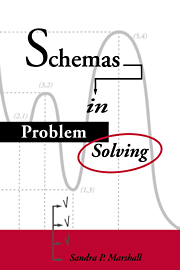Book contents
- Frontmatter
- Contents
- Preface
- Acknowledgments
- I Fundamentals
- II Schemas and instruction
- III Learning from instruction
- IV Schemas and assessment
- V Schema models
- 12 Production systems, neural networks, and hybrid models
- 13 The performance model
- 14 The learning model
- 15 The full schema model
- 16 Some concluding remarks on schema theory
- Notes
- References
- Name index
- Subject index
14 - The learning model
Published online by Cambridge University Press: 22 October 2009
- Frontmatter
- Contents
- Preface
- Acknowledgments
- I Fundamentals
- II Schemas and instruction
- III Learning from instruction
- IV Schemas and assessment
- V Schema models
- 12 Production systems, neural networks, and hybrid models
- 13 The performance model
- 14 The learning model
- 15 The full schema model
- 16 Some concluding remarks on schema theory
- Notes
- References
- Name index
- Subject index
Summary
As part of the initial stages of developing appropriate schemas, individuals must learn to recognize the situations to which the schemas pertain. This recognition requires identification knowledge. The performance model of the previous chapter focused on how individuals use their identification knowledge to effect the recognition. The cognitive maps and the performance model both target this necessary early step in schema formation. Identification knowledge can be modeled very well using relatively simple connectionist models, and the performance model of chapter 13 provides one example. A second example is described here. It is a competitive learning model that learns to recognize the problem-solving situations when given appropriate feedback. Both of these models were developed and evaluated as a first stage in building the complete schema model, which is described in chapter 15.
The task to be modeled
This model was developed to learn the appropriate classifications for 100 story problems, using the situations depicted in them as the basis of the classification. Each problem is represented by a set of characteristics that the model uses in making its decisions. Five output responses are possible, and the model selects the one that appears to be most in accord with the input characteristics. During learning, the model responds many times to all 100 story problems.
Information
- Type
- Chapter
- Information
- Schemas in Problem Solving , pp. 362 - 376Publisher: Cambridge University PressPrint publication year: 1995
